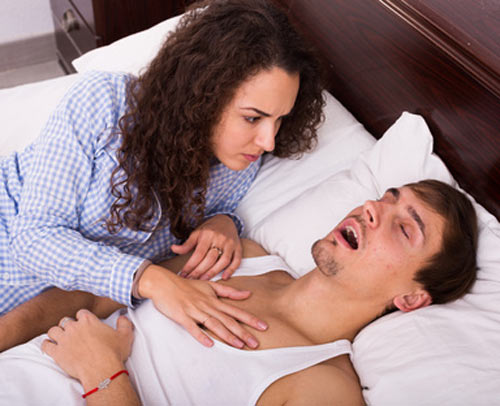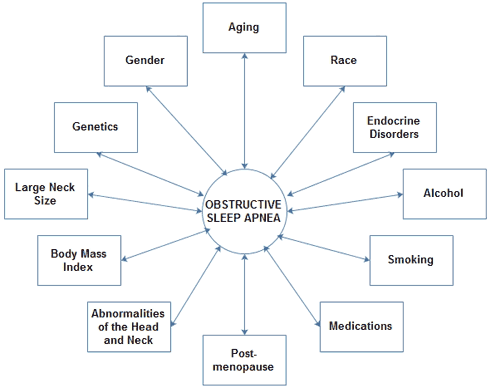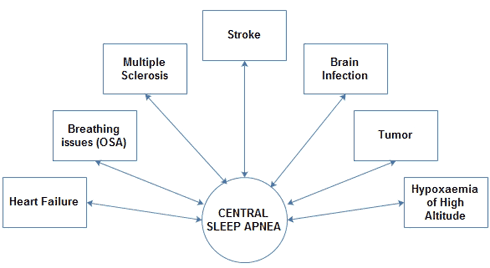Causes of Sleep Apnea
Obstructive and Central Sleep Apnea Causes

Before you start searching for a treatment, you need to discover the causes of sleep apnea.
Many people think that sleep apnea is caused by obesity; however, there are severe cases where the patient is very thin.
In other words, obesity is not the only risk factor for developing a sleep breathing disorder.
Scientists discovered many primary causes of sleep apnea, including obesity, gender, age and medical conditions.
Finding the cause of YOUR sleep apnea, is truly the most important step to an effective treatment.
12 Causes of Obstructive Sleep Apnea
1. Body Mass Index (BMI)
Obesity is one of the most important causes of sleep apnea. Scientists discovered that people who are overweight (BMI of 25 to 29) and obese (BMI of 30 and above) have the higher risk for OSA.
Numerous studies have shown correlations between the prevalence of obstructive sleep apnea syndrome and obesity.
The studies have demonstrated that obesity increases the rate of progression of sleep apnea, and weight gain further accelerates disease progression.
Even mildly overweight people are at risk of having obstructive apnea. Read the study here.
With every 10% weight gain, the apnea hyponea index (AHI) increases with almost 32%.
However, losing 10% of weight will decrease the AHI with 26%. Read the study here.
2. Large Neck Size
Men and women with large neck size:
- 17 inches or more for men,
- 16 inches or more for women.
In addition, waist/hip ratio is another important risk factor for OSA (ratio of 0,85 in women and 1 in men).
3. Genetics (family history)
Evidence is accumulating that genetic factor may be one of the primary causes of sleep apnea. The risk factors arise from changes of the upper airway structure:
- alteration in craniofacial structures
- enlargement of important upper airway structures (tongue, soft palate, and lateral pharyngeal walls)
- modification to regional fat distribution.
Read the results of the study here.
4. Gender
Male gender - Recent studies demonstrate that OSA is 2 to 3 times higher in men than women. However, this gap between man and women decreases after the menopause.
Why men are at higher risk for OSA is not entirely clear but appear to be related to hormonal influence.
Gender differences in the prevalence of obstructive sleep apnea may also be related to body fat distribution.
Men exhibit a more central fat distribution, including the neck, thereby increasing the risk for narrowing and blockage of the upper airway.
5. Post-menopause
Postmenopausal women are at higher risk (3.5 higher) for obstructive apnea than are premenopausal women.
Hormone replacement therapy may reduce the risk of OSA in postmenopausal women; however, this therapy is problematic due to the increased risk of cardiovascular disease and carcinoma of the breast and uterus.
6. Aging
Increasing age - when you become older, there is an increased risk to get a sleep disorder. Almost 62% of persons over 65 years had 10 or more apnea events per hour.
The effect of age is complex. Population studies illustrate higher prevalence of OSA with increasing age, peaking in the fifties and sixties.
7. Race
Sleep apnea is more common in African-Americans (2.5 times more common) and Asians than in Caucasians.
8. Endocrine disorders
Hypothyroidism
Hypothyroidism, especially myxedema, is associated with an increased prevalence of obstructive (from the damage of muscle function) and central sleep apnea (through blunted ventilatory response).
Macroglossia
Macroglossia associated with hypothyroidism contributes to the higher frequency of sleep disordered breathing.
Acromegaly
Sleep apnea syndrome is more common and often severe in acromegalic patients (a chronic disease marked by enlargement of the bones of the extremities, face, and jaw) presumably related to a large tongue narrowing the upper airway.
9. Alcohol
Alcohol relaxes the upper airway muscles and can lead to partial or complete airway obstruction during sleep.
Alcohol is also a risk factor for upper airway resistance syndrome (UARS), another dangerous sleep breathing disorder.
Men who consume more alcohol than average have 25% greater risk for developing OSA.
10. Cigarette Smoking
Smoking decreases the amount of oxygen in your blood and with alcohol reduces the upper airway tone.
Studies have shown that heavy smokers (with more than 40 cigarettes/day) have the greatest risk of mild OSA.
11. Medications
Hypnotic and sedative drugs, such as narcotics, benzodiazepines (flurazepam, zolpidem) may increase the risk for airway collapse.
It's better to avoid these medications during your treatment for sleep apnea.
12. Abnormalities of the Head & Neck Soft Tissues
Although obesity is the most common cause of OSA, sleep apnea also occurs in non-obese patients with craniofacial features.
Here are some causes of sleep apnea in these patients:
- narrowing of the hard palate,
- small jaw,
- long or large tongue,
- mandible displaced backward,
- large tonsils and adenoids (especially in children),
- people with Down Syndrome,
- nasal abnormalities, including septal deviation and allergic rhinitis.
Tips to Eliminate Several Causes of Sleep Apnea

Smoking is a common factor that can decrease the amount of oxygen in your blood and reduces the upper airway tone. It's wise to stop smoking to help improving OSA.
Have you tried positional therapy for sleep apnea? This can really helpful for patients with mild or moderate sleep apnea.
Avoid narcotics in the evening.
Did you know that weight loss is one of the most effective treatment for patients with obesity and OSA?
Do you like to drink alcohol in the week as well as at the weekend? You should avoid alcohol, because it can increase the number of apnea events.
Practicing sleep apnea exercises daily will boost your health, improving your physical and mental condition.
Shift work can aggravate your sleep apnea symptoms. If you are in this situation, you should definitely change your schedule to a normal one, or to change your job to a daily program schedule.
Causes of Central Sleep Apnea
So far we have discussed about the causes of sleep apnea due to narrowed upper airway.
However, breathing during sleep may be also affected by a problem in the brain, more exactly in the central output of the respiratory muscles.
The control center of the respiratory muscles can be affected by different health factors, such as:
- stroke,
- brain infection,
- multiple sclerosis,
- the presence of a tumor,
- breathing-mechanical issues, such as obstructive apnea.
- hypoxaemia of high altitude may promote central apnea events during sleep.
- left ventricular heart failure, which also causes Cheyne–Stokes respiration.
For more info on central apnea causes, symptoms and treatments, see central sleep apnea.
Home › Causes of Sleep Apnea









